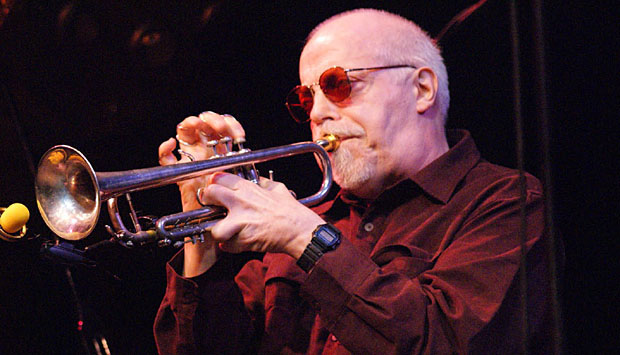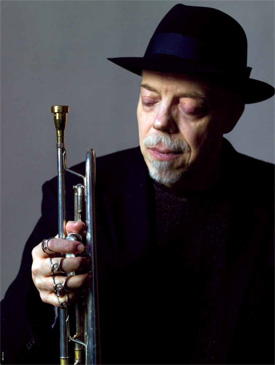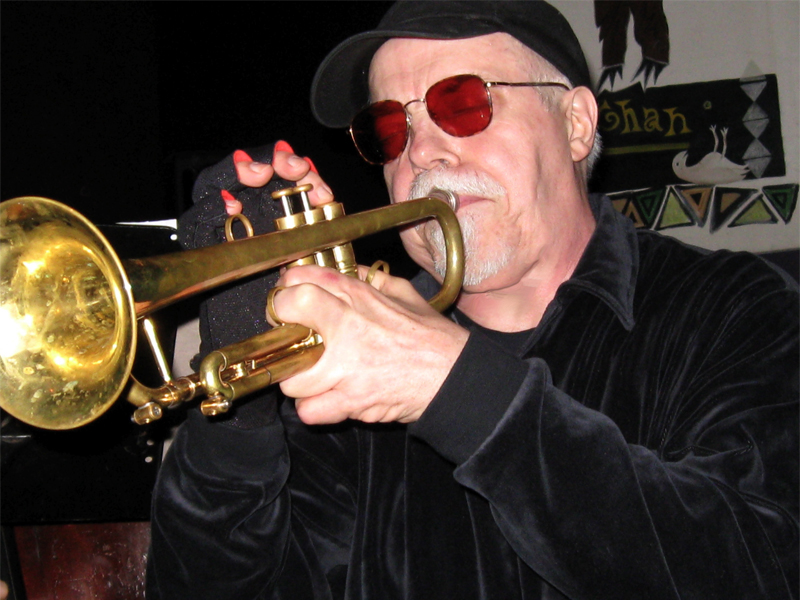Home » Jazz Articles » Profile » John McNeil's Backbone
John McNeil's Backbone

"This is the part of any jazz gig where the band plays a blues and one of us talks over it. That's how you know it's jazz...I think," said McNeil, 62, to the audience spread out on the lawn before the gothic Connecticut State Capitol in Hartford. McNeil's voice was deep and rich, like a morning-drive deejay's. "Our drummer, Jochen Rueckert, just flew in from Germany where he lives in his ancestral castle...He has people killed for his amusement," he said, deadpanning.
Typically droll and self-deprecating, McNeil reaches for humor, often of the dark sort, whenever possible. (Recovering in the hospital recently from a staph infection that only a single type of antibiotic could kill, he said, "It's showing signs of becoming totally drug resistant, at which point it'll be like the 19th century, like, 'Bye.") But beneath his conviviality lurk strains of disharmony. McNeil is struggling. He always has.
Chill Morn, He Climb Jenny (Sunnyside, 2010), doesn't show it. New York Times critic Ben Ratliff called his recent playing "astonishing in its harmonic acuity." This wasn't always the case, and not for lack of talent or skill. McNeil has Charcot-Marie-Tooth disease, a painful genetic disorder of the peripheral nerves that affects muscle control.
As if concocted to beset trumpet players, the degenerative condition has, among other complications, attacked his diaphragm, integral to blowing air through the horn; his facial muscles, which help produce tone and timbre; his tongue, which controls articulation; and his fingers, needed to work the trumpet's valves. The recurrence of Charcot-Marie-Tooth disease —it comes in waves—has forced McNeil to quit playing altogether several times since he came on the jazz scene in the mid-1970s. At times, he's had to use a laundry rack to support his trumpet while practicing. He had a dental bridge built to refocus his embouchure. He learned to play with his left hand, to give him an alternative when his right hand won't cooperate. And in an art that prizes timing, the degeneration of his reflexes has demanded he play slightly early so the notes arrive on time.
Now, his performing career is on the upswing again. But he remains on guard, because as long as he can remember, his body and his soul have been enemies.
Some, though, just know him as a master of the music.
 "The thing about John is that you can't separate his personality from his musicianship. He's extremely funny and witty, and as a musician he's an exemplary, studied cat. He's a great teacher, somebody who can communicate, perform, and hand it down to others," said Dave Liebman, 62, the renowned saxophonist with whom McNeil worked in the 1980s, in a phone interview. "He is unheralded, unrecognized, in the trenches taking care of business, constantly growing. He deserves any kind of recognition that he gets."
"The thing about John is that you can't separate his personality from his musicianship. He's extremely funny and witty, and as a musician he's an exemplary, studied cat. He's a great teacher, somebody who can communicate, perform, and hand it down to others," said Dave Liebman, 62, the renowned saxophonist with whom McNeil worked in the 1980s, in a phone interview. "He is unheralded, unrecognized, in the trenches taking care of business, constantly growing. He deserves any kind of recognition that he gets." Liebman was unaware that the night before they were to record McNeil's 1983 live album, The Things We Did Last Summer, the trumpeter was suddenly unable to move the fingers of his right hand, or to get enough air through the horn to produce a clear tone. According to McNeil, he scuffled through that concert, but soon after decided to take a hiatus from recording and performing to fight the Charcot-Marie-Tooth disease. He couldn't afford to sound bad. It was a battle he'd long been familiar with.
"I might ramble, it's the drugs talking," said McNeil, as he sat down for coffee near his apartment in Park Slope, Brooklyn. He takes daily doses of Oxycodone for pain (Oxycontin is the time-release version of the same drug: "When I need it, I need it now," he said). Over the years, Charcot-Marie-Tooth disease has attacked his body from so many directions that it has left him with the posture of someone frozen in a dance to unheard music.
McNeil was born in 1948, in Yreka, Calif., in the shadow of Mount Shasta. When he was found to have problems with his legs as a toddler, it was assumed he had muscular dystrophy like his disabled uncle. McNeil's father, a grocer and the town's mayor, had already lost his first son, Daniel, to cystic fibrosis. He encouraged McNeil, who could hardly grasp a pen, and lived for years in various braces for his legs and twisted spine, to fight the disease.
"Back then doctors expected you to live only to twelve or thirteen," said McNeil, passing the crooked fingers of his left hand over half-shuttered eyes and a white goatee. "The attitude was, 'Don't worry about it, you're not going to be around.'"
 McNeil's father, who experienced late-onset Charcot-Marie-Tooth disease in his 70s, enlisted the help of a local trainer to work with his son. Every week they would exercise with weights together, building McNeil's stamina and body control.
McNeil's father, who experienced late-onset Charcot-Marie-Tooth disease in his 70s, enlisted the help of a local trainer to work with his son. Every week they would exercise with weights together, building McNeil's stamina and body control. McNeil's sister Rory, 50, who didn't inherit either disease, and until recently was also Yreka's mayor, remembered their childhood.
"I didn't realize he had those disabilities. If he was walking by I'd throw a snow ball right at him. He would have expected nothing less," she said, laughing. "It's hard to be different. It shaped his personality, which is a little cynical, a little tough. The disease has ravaged him, but fortunately it hasn't damaged his spirit or his brains. He's a special guy."
McNeil was inspired to become a trumpeter when he saw Louis Armstrong with his signature handkerchief on an episode of the "Milton Berle Show" in the late-1950s. But when McNeil's family took him to the Mayo clinic in Minnesota where he was finally diagnosed with Charcot-Marie-Tooth disease, a doctor said that exercise would only hurt him, and that he could never achieve the coordination to be a professional musician.
"I realized, 'He doesn't know anything. He really doesn't know anything," said McNeil, whose health had improved from physical activity. He became skeptical of medical authority; he would have to deal with his disease on his own.
McNeil briefly attended college in Oregon and Florida, settling in Louisville, Ky., where he paid his dues as a musician, working pickup gigs and making occasional forays to New York. He finally moved to New York City in 1974, at the age of 26. By that time, his symptoms had stabilized.
"I used to go to Roseland where all the club date agencies booked musicians. I bugged them until they called me, 'our friend the paper cut,'" said McNeil. He started to get sent out on gigs, one of which was for a big band that performed with music stands but no music. "The leader would give you a feature and say, 'Waltz, C, go.' And that would be it."
McNeil would go jam with Art Blakey and the Jazz Messengers at Boomer's, the long defunct downtown club. His reputation spread, earning him an audition with Horace Silver. "I never laughed so hard in my life," said McNeil of his reaction to Silver's phone call welcoming him to the band. McNeil lasted a year and a half before being fired for "insubordination." "I called him a 'deaf motherfucker,'" he said, remembering his retort when Silver blamed him for another band member's repeated mistakes.
His bravado, though, was cooled by his idol, trumpeter and composer, Thad Jones, who invited McNeil to sit in with his big band, co-led with drummer Mel Lewis, at the Village Vanguard.
"He wasn't kind," said McNeil, remembering their exchange. "'Why are you stupid?' he said. 'You've got a lot of ideas but you've got to make them work for you...or sooner or later you're going to run out of them.'" Jones was referring to the tendency of young improvisers to play too many notes too quickly, rather than patiently developing melodic ideas that reveal thought patterns.
"In one day I was a different player. He got my attention...I was left with the feeling I should be ashamed of myself," McNeil said. After McNeil returned and played again, Jones said nothing, but slowly, the corners of his mouth crawled upward to form a smile. "It was the best reward I ever got in my life."
McNeil began to lead his own groups and make records on the Steeplechase label. It was then that he met Lolly Bienenfield, a freelance trombonist from Long Island. They've been together romantically for more than 30 years.
 "After we met, he left Billie Holiday's 'P.S. I Love You' on my answering machine," she said. Their bond became essential to McNeil's survival in the years to come.
"After we met, he left Billie Holiday's 'P.S. I Love You' on my answering machine," she said. Their bond became essential to McNeil's survival in the years to come. In his early 30s, McNeil started having difficult days. He would drop things. He couldn't blow air through his horn. He didn't have any energy. He couldn't write. McNeil retreated from the scene. He had the dental bridge custom built to strengthen his embouchure. And he practiced.
"It's always been important for him not to pity him. He's an unbelievable optimist, someone who knows who he is," said Bienenfeld. "He's part undaunted spirit, part coot."
No Zen master, McNeil has a temper. "John yells. He made me yell rather than doing the classic female thing, which is shut it all in," she said. "I remember one time his face was so close, he was spitting."
By 1986, McNeil had written new music for an important record date, only to have to cancel once again due to a relapse.
"So once again he quit performing," said Bienenfeld, who had been supporting them both financially through the difficult period. McNeil began teaching at the New England Conservatory of Music in Boston, Mass. He has now been on the faculty there for over 20 years. "He put himself on a tedious six-hour a day practice routine...to be able to hold his horn to his face for so many hours he used a laundry drying rack to support the trumpet."
McNeil practiced this way, ritualistically, for two years. And just when his facial muscles were getting back into shape, he suddenly lost control of his right hand. McNeil's response was to have the trumpet-maker he endorsed, Kanstul, build him two left-handed instruments. But he had to learn to play with his left hand.
When jazz musicians improvise, they try to play what they hear in their mind's ear. So often, McNeil had to learn to hear what might be possible for him to play given his physical limitations. Over the years, his ordeals have also demanded he approach the instrument in every way possible, in fact, in ways that perhaps no other trumpet player ever has, said Russ Johnson, a Brooklyn-based trumpeter who counts McNeil as a mentor.
"His physical limitations have helped a lot of trumpet players," he said by telephone. "His trumpet book had you practice difficult passages with the left hand so that they're easier to do when you switched back to your right. It forced your brain to work to work a different way."
McNeil made a record, Fortuity, left-handed. He also started to take daily doses of human growth hormone, which combats muscle wasting. It brought his right hand back to life. But his back had also started to bother him.

"In '93 basically my spine disintegrated," said McNeil, who was then experiencing insufferable pain, and the feeling that his legs were either crawling with bugs, or on fire, or both. Doctors at the Hospital For Special Surgery in New York determined that he had neuropathic spine, a condition related to Charcot-Marie-Tooth disease. Two upper vertebrae had dissolved, internally exposing his spinal cord. Doctors told him a wrong move could bring paralysis, even death. He was asked if he had his will.
Collapsing a lung to gain access, it took doctors 13.5 hours to reconstruct his upper spine using bone from his ribs and both hips held in place by screws, and metal rods. Before the surgery McNeil asked if the screwdriver used in such a sophisticated procedure might be "special." The surgeon said, "No."
McNeil's surgery was a success, making him 1.5 inches taller despite having had two discs removed. As he recovered, he began again to exercise and build muscle tone. He also increased his growth hormone dosage, which now costs him and Bienenfeld between six and eight hundred dollars a month. McNeil railed against a bill sponsored by New York Sen. Charles Schumer, a Democrat and Iowa Sen. Charles Grassley, a Republican, which aims to curb the abuse of growth hormone among professional athletes and others by classifying it a controlled substance. Doing so, McNeil said, would make it more difficult to obtain for the sick people who really need it.
"I'm not trying to hit home runs, I'm trying to climb stairs. Without growth hormone, my career would be over," said McNeil, walking briskly back to his apartment, fortified also by caffeine.
The last few years have been especially productive for him. His records have garnered critical acclaim. He's led his own week-long engagement at the Village Vanguard, the same club where he was once set straight by Thad Jones.
"Take the body away, you can think about music, but nobody can hear it," he said before ascending to his third floor walk-up.
Selected Discography
John McNeil/Bill McHenry, Chill Morn He Climb Jenny (Sunnyside, 2010)
John McNeil/Bill McHenry, Rediscovery (Sunnyside, 2008)
John McNeil, East Coast Cool (OmniTone, 2006)
John McNeil, Sleep Won't Come (OmniTone, 2004)
John McNeil, This Way Out
< Previous
Live At Art Gallery Reutlingen
Next >
The Music of Paul Motian
Comments
Tags
John McNeil
Profiles
Ben Waltzer
United States
New York
New York City
Jochen Rueckert
Dave Liebman
Louis Armstrong
Art Blakey
Horace Silver
Thad Jones
Mel Lewis
Billie Holiday
Russ Johnson
For the Love of Jazz
 All About Jazz has been a pillar of jazz since 1995, championing it as an art form and, more importantly, supporting the musicians who create it. Our enduring commitment has made "AAJ" one of the most culturally important websites of its kind, read by hundreds of thousands of fans, musicians and industry figures every month.
All About Jazz has been a pillar of jazz since 1995, championing it as an art form and, more importantly, supporting the musicians who create it. Our enduring commitment has made "AAJ" one of the most culturally important websites of its kind, read by hundreds of thousands of fans, musicians and industry figures every month.
You Can Help
To expand our coverage even further and develop new means to foster jazz discovery and connectivity we need your help. You can become a sustaining member for a modest $20 and in return, we'll immediately hide those pesky ads plus provide access to future articles for a full year. This winning combination will vastly improve your AAJ experience and allow us to vigorously build on the pioneering work we first started in 1995. So enjoy an ad-free AAJ experience and help us remain a positive beacon for jazz by making a donation today.Near
Popular

Interview
Albert "Tootie" Heath: Class Personified

Chats with Cats
Women in Jazz Media: Kim Cypher

Live Review




















